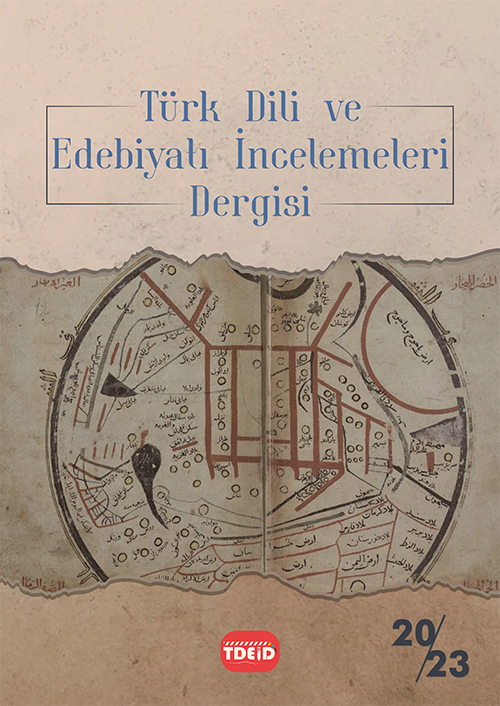Irony in Feyyaz Kayacan's Story titled The Adventures of Hiçoglu
DOI:
https://doi.org/10.5281/zenodo.12626017Keywords:
Feyyaz Kayacan, The Adventure of Hiçoğlu, irony, irony in the storyAbstract
Although the art of irony, which has its roots in Turkish Literature, is mostly in the form of verbal irony in Feyyaz Kayacan's stories, many subheadings of irony such as event, situation, tragic and verbal irony are also used. Unlike the artists of the 1950s generation, Kayacan considered irony to be the dominant element. The author made irony through word games, by distorting the structure of idioms and proverbs, and sometimes through misunderstandings, as in Socratic irony. For this reason, he used the element of humor to give literary identity to individuals who were marginalized by society, remained distant from social acceptance, and had problems with their mental and physical health. In other words, the author included unusual social problems in his works. He approached social problems from a different, unconventional perspective through Hiceglu. Irony detections were made in Feyyaz Kayacan's story "Hiçoğlu'nun Adventures" and the traumas experienced by the hero in the story were examined. He explained the traumas he experienced in a more effective and efficient way, with the help of the features of irony. Linguistic disorders are sometimes encountered in his works due to the influence of foreign languages. In his works, he enriched them with ironic expression, based on the possibilities of plain language and expression.
References
Boynukara, Hasan (2008). Modern Eleştiri Terimleri, İstanbul: Boğaziçi Yayınları.
Cebeci, Oğuz (2008). Komik Edebî Türler, Parodi, Satir ve İroni, İstanbul: İthaki Yayınları.
Egan, Cort (2009). İroninin Kurbanı. (Çev. Y. Salman. D. Hakyemez). Kitaplık Aylık Edebiyat Dergisi. 123, 64-69.
Evis, Ahmet (2020). Güven Turan’ın Dalyan Romanında Benlik Arayışı, Yeni Türk Edebiyatı Araştırmaları, S.24.
Genç, M. S. (2008). Emil Michel Cioran ve metafiziksel ironi. Cogito Dergisi, İroni Özel Sayısı, 57, 69-210.
Güçbilmez, Beliz (2005). Sophokles’ten Stoppard’a İroni ve Dram Sanatı. Ankara: Deniz Kitabevi.
Hançerlioğlu, Orhan (1979), Saraka. Felsefe Ansiklopedisi İçinde. (C. 6). İstanbul: Remzi Kitapevi.
Haşimi, Ahmet (2021). Vural Bahadır Bayrıl Şiirinde Anlamın Yeniden İnşası. Vural Bahadır Bayrıl Kitabı, (Editör: Ahmet Evis), s. 311-350, Ankara: Sonçağ Akademi
Kaya, Nilay (2009). Feyyaz Kayacan Öykücülüğünde Görme Problemi. Yayımlanmamış Yüksek Lisans Tezi. Boğaziçi Üniversitesi Sosyal Bilimler Enstitüsü. Türk Dili ve Edebiyatı Anabilim Dalı. İstanbul.
Kierkegaard. Soren (2004). İroni Kavramı. (Çevr.: Sıla Okur, Türkiye İş Bankası) Kültür Yay. İstanbul.
Kierkegaard, S. (2009). İroni kavramı. Sokrates’e Yoğun Göndermelerle, Çevr. Sıla Okur. Ankara: İmge Kitabevi Yay.
Karadeniz, Mustafa. (2020), Postmodernizm ve Türk Öykücülüğündeki Yansımaları, Bizim Külliye, 53-54
Lekesiz, Ömer (1999). Yeni Türk Edebiyatında Öykü 3, ‘Öykücüler ve Öykü Anlayışları, Öyküler ve Çözümlemeleri’. C.3. İstanbul: Kaknüs Yayınları.
Oğuz, Orhan (2007). Ahmet Hamdi Tanpınar’ın “Acıbadem’deki Köşk” Hikâyesinde Mekânın Kullanımı, SDÜ Fen Edebiyat Fakültesi Sosyal Bilimler Dergisi, Sayı:16, ss.163-178.
Platon, (2005b), Sokrates’in Savunması, İstanbul: Devin Yayınevi.
Tosun, Necip (2008). Erken Bir Postmodern: Feyyaz Kayacan Öykücülüğü. Kitablık Dergisi, 118, 106-108.
Vıla-Matas, Enrique (2009). İroni Üstüne, (Çevr. O. Türkay) Kitablık Dergisi. 123. 78-79.
Downloads
Published
How to Cite
Issue
Section
License
Copyright (c) 2024 Türk Dili ve Edebiyatı İncelemeleri Dergisi

This work is licensed under a Creative Commons Attribution 4.0 International License.







